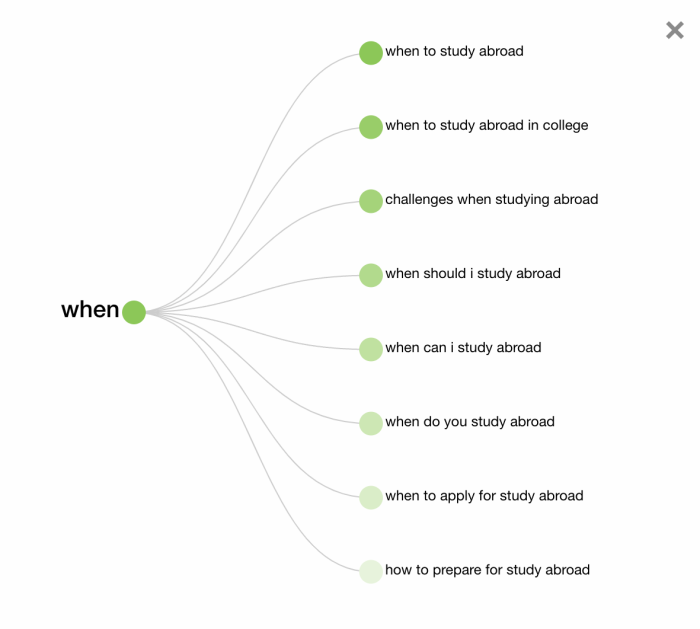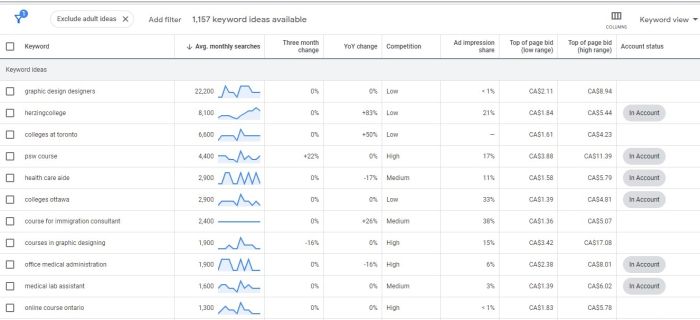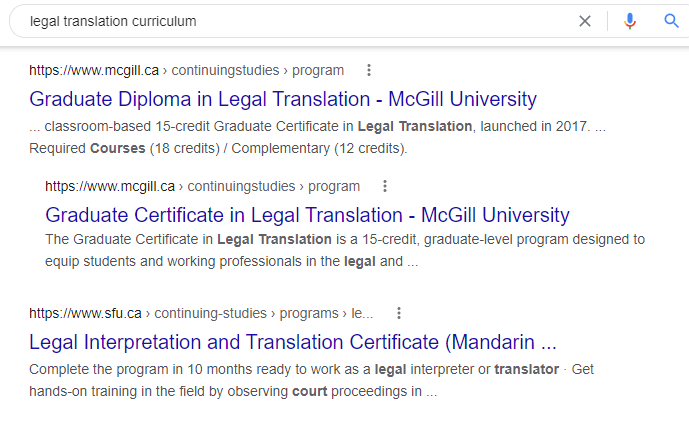Keywords are the bedrock of your school’s SEO strategy. They determine the kind of content you’ll be creating for your website and how well that content performs on search engines. Applicants will use certain keywords when researching different schools online. By identifying and targeting those keywords, you’ll be able to get your school’s website in front of the right audience.
But choosing the right keywords is a strategy on its own. With so many schools competing for the top results on search engines, high-gain keywords have become a gold mine of exposure for your institution. SEO for higher education is about understanding your target audience, evaluating your competition, and knowing exactly what search engines are looking for. Performing proper keyword research is crucial to ensuring you land the right keywords that deliver results.
Read on for some expert tips on finding good keywords to support your school’s SEO strategy.
1. What to Look for When Conducting Keyword Research
The best tip for finding high-performing keywords is research, research, research! But effective keyword research begins with knowing the fundamentals of SEO for higher education. You can’t just assume a keyword is right because it sounds right. There are many different factors at play when it comes to what determines a high-gain keyword.
Search engines like Google generally rank keywords according to relevance, authority, and volume. If you use a keyword in your content, how much value does that content offer to a user? Is it a helpful and informative resource? How often do users search for that keyword? The goal is to find popular keywords that your school can compete for and develop high-quality content around those.
When compiling a list of keywords, think about the kinds of topics that you want your school to rank for. Does your school offer a specific program? Where is it located? Are you trying to reach undergraduate or graduate students? These are all things that define your school and help it stand out from the competition, so your keywords should reflect that.
2. Identify the Search Intent of Prospective Students
When it comes to SEO for higher education, high-performing keywords are those that prospective students actually search for. Getting to those keywords requires your school to think about what information potential applicants look for on search engines. Many students may be wondering about the benefits of a specific program, the courses on offer, or the career opportunities available.
Example: If a prospect types “why become an osteopathic manual practitioner” into the Google search engine, they’ll find a blog post from the Canadian Academy of Osteopathy that addresses their question. The blog post appears as the top result on Google, thanks to relevant keywords (such as “become an osteopathic manual practitioner”) being used in the content.


When thinking about user intent, location targeting is an important factor to consider. If you’re able to narrow down a search with local SEO, the competition for user attention becomes significantly less. Think about it: many prospects will be searching for things like “MBA programs” – and many schools will be vying for a spot in those search results.
However, a keyword like “MBA programs in France” will be used by prospects looking for schools in a specific area. Rather than competing with the vast number of MBA schools around the world, you’ll be competing with a much smaller number of schools based in France. These geo-targeted keywords allow your school to get specific with what makes it unique and have a better chance of targeting the right audience for your school. Not to mention, local searches add up to almost 73% of Google’s total search activity, so don’t shy away from focusing on these kinds of keywords in your strategy.
3. Look at Similar Search Terms
If you’re struggling to come up with new keywords, search engines like Google are your friend. When conducting keyword research, your school can make use of autocomplete to get a sample of what the most-searched keyword variations are. For instance, by typing the first two words of a keyword into Google, you can see a list of the most likely searches using those words. This is an easy tip that is available for any school to use.
For example, typing “healthcare programs” into Google offers a list of popular searches. “Healthcare programs in Canada” or “healthcare programs online” are suggestions of other relevant keywords a school could use.


Along those same lines, Google also offers a list of related search terms once you type in a keyword. Simply scroll down to the bottom of the search results and look for the “Searches related to…” section. In the example below, you can see a list of related searches for the keyword “accounting courses.”


Schools looking for other accounting-related keywords will be able to find some variations that specify a location and other aspects of the course. These suggestions can help you focus your online reach with keywords that match what prospects are looking for.
A tip from HEM’s Director of Search and Analytics, Alexander Nachaj, is “don’t worry too much about exact match keywords – that is, thinking you have to have your keyword appear exactly the same in everything.” For example, if your keyword is “healthcare programs Canada,” it’s perfectly fine to add “in” before Canada or modify your keyword to make it work grammatically. “In fact, having grammatically clear headers, titles and phrases are better than ones that read poorly,” explains Alexander. Once again, it’s about understanding the different factors that determine high-gain keywords; carefully-considered, high-quality content is one of those factors.
4. Make Use of Online Tools
Keyword research tools are a great option to boost SEO for higher education. Once you know the kinds of topics you want to rank for, these tools can help you refine your list of keywords by offering more ideas based on exact match keywords. SEMRush, Moz, Google Trends, and Keyword Planner are just a few of the online tools available to your school.
Finding new relevant keywords is the main goal of these tools. If you have a starting keyword that you want to rank for, tools like AnswerThePublic can be particularly useful for identifying long-tail versions of those keywords–which are often difficult to come up with but easier to rank for. This tool even reveals common questions that prospects ask around a keyword.
For example, if you enter the keyword “study abroad,” the tool generates popular searches using that keyword. This can help you generate ideas for content topics to write about that will bring context and relevance to your keyword.




Source: AnswerThePublic
Many tools not only help you come up with new keywords, but they also ensure that the generated keywords are ones that will reap good results. With a whole bank of data on hand, these tools can help you see what’s currently being searched in the education sector.
Google Keyword Planner helps you measure the strength of your keywords by revealing average monthly searches and the cost-per-click of using that keyword in your university website SEO. These metrics will help you determine how much interest a keyword has – whether it’s popular enough to integrate or too popular to compete for – and plan your budget.
Below is a screenshot of Google’s Keyword Planner in action:


The “Competition” column reveals the chance of ranking for a specific keyword. As you can see, even a “Low” competition keyword like “graphic design designers” can still generate over 22,000 monthly searches, so be mindful of this when deciding which keywords will get your school noticed.
Gain Insights on Competitor Schools
Along with information on what applicants are searching for, keyword research tools are a valuable insight into what other schools are doing. You can perform a competitive ranking analysis using tools like Moz to get an idea of the wider landscape of SEO for higher education.
Ask yourself which competitors are outranking your school on search engines and how you can learn from them. If a competitor school is ranking for a keyword that you already use, it might be time to reevaluate how you can use that keyword in your content strategy to generate higher gains. On the other hand, you might discover some new high-gain keywords that you can integrate into your content. As Alexander puts it, “you can assume those schools did their research and are going after high potential keywords, so it never hurts to try to match them.”
However, he also cautions against entering into a losing battle — “for instance, if Wikipedia or a top 10 university in the world is ranking high for a keyword, you probably don’t want to try and compete because it will be very difficult or even impossible.”
Keep in mind that 15% of daily Google search queries are ones that have never been searched before. New keywords with high potential are coming up all the time, so don’t be discouraged if the competition for others is too great.
5. Update Your SEO for Higher Education to Reflect New Trends
As prospective students continue to seek new experiences and opportunities from their education, SEO for universities must adapt to match their current intent. You may find that what was once a high-performing keyword for your school has become increasingly competitive, or its search volume has dropped. Perhaps your school is looking to promote a new program or switch up its branding. In that case, an SEO audit can help you review the relevance of existing keywords and identify new keyword opportunities.
At the very least, always do some searches in Google and see what actually pops up when you type a keyword in. Sometimes, the results are surprisingly off-topic, meaning you can probably cross that word off your list.
According to Alexander, a good keyword review should also account for the power (and potential pitfalls) of synonym matching. “Google’s algorithm loves to match words with what it thinks are appropriate synonyms,” explains Alexander. Sometimes this can boost your avenues for exposure. However, sometimes the matching gets a little too broad, which may or may not be what was intended.
For example, the keyword “legal translation courses” in your content can also rank for similarities like “legal translation certificate.” Below, you can see what a search for “legal translation curriculum” returns. “Curriculum” triggers the synonyms “course,” “certificate,” and “diploma,” while translation triggers “translator.”


According to Alexander, “in most cases, this is not a bad thing; it means your course or diploma page can trigger for more words than the ones you optimized for. But it can also make optimizing pages for a single keyword difficult if they trigger so much.”
A tip from Alexander to review these effects is to do some tests after optimizing a page to see what keywords cause it to appear. You can also review your school’s data to see what prospects searched to actually get to the page. By understanding which keywords are delivering the intended results, you can make relevant adjustments to the way you optimize your content.
Google alone currently processes around 8.5 billion searches per day, and this number is only set to increase. It’s now more important than ever to select relevant, high-gain keywords if you want your school’s content to compete in the growing crowd of search results. By performing focused research, employing the right tools, and knowing how to finesse search engines, you can give your school and its website the best possible chance at success.

